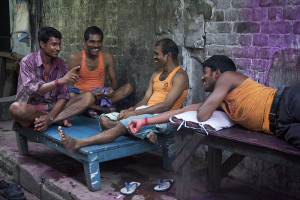Male Friendships
From an early age in the U.S., I’ve always had more girls as friends than guys. It was an inevitable outcome from being awful at any sport I tried and joining a children’s theatre group. In gym class I was certainly the token boy who hung out with all the girls in order to avoid doing the contact sport that most of the boys went for. My friendships with other guys have always existed, but I’ve never had an all male friend group and a lot of my friendships with other guys have paled in comparison to the friendships I’ve had with girls. But, in India, almost all my friends are guys. I was at first puzzled in Bangalore when I saw guys walking down the street holding hands as friends. Sometimes, two guys walking side by side will be holding pinkies together. Sitting next to each other at a restaurant, one guy will have his arm resting on the back of another guy’s chair as they talk casually. In working with some students with my NGO here, I’ve seen thirteen-year-old boys sleeping on the bus while holding each other. Male friendships in India share a much more intimate physical and emotional relationship than those in the West.

I hypothesized at first that a general failure to acknowledge gay sexual orientation must mean that Indian men don’t have to feel insecure about being called gay and can spend as much time as they want with other men openly showing affection. This idea came mostly from what I know about male friendships in the United States. In the U.S., many men feel uncomfortable physically or verbally expressing their affection for other men because social norms forbid them from doing so. Presented with images and ideals of hypermasculinity while also fearing being called gay, many men feel the pressure to show a stoic façade. Yet, I have observed that younger generations are changing the country’s attitudes. As the acceptance of same-sex marriage dominates the minds of the millennial generation in the U.S., I’ve noticed straight men showing affection for each other in ways unprecedented by older generations. Two guys sleeping in the same bed, one man sitting on the lap of another man, or one guy walking with his arm around another isn’t weird anymore. For most, one man saying something sentimental to another man no longer warrants the words “No homo.” The growing acceptance intimacy in male friendship has even prompted the term “bromance,” which is defined as a close, emotionally intense, non-sexual bond between two or more men.
But contrary to what I originally thought, the closeness of male friendships in India might have little to do with a narrow-minded view of sexual orientation. Like in many cultures, I’ve observed that many parents have stricter rules for their daughters than their sons. While many men might be able to stay out later at night and socialize with either gender, many women feel more intense pressure to socialize with only other women and adhere to a stricter curfew. A woman more than a man might be subject to answer uncomfortable questions if friends or family see her hanging out with the opposite sex.
The kind of friendships that I have with the opposite sex in the U.S. are much harder to come by in India. The sometimes flirtatious but always more emotional conversations I would be more inclined to have with female friends in the U.S. now happen only with other men in India. Since sharing physical affection and emotional expression is less possible with women in India, men turn to other men for this role. The result is a culture filled with male friendships that feel more complete than those in the U.S.
I believe that the nature of opposite-sex friendships are dynamic and exciting. Upon returning to the U.S., I look forward to catching up with the female friends I’ve been lucky enough to have. But, I’m excited to catch up with the male friends I have too. I’ve learned in India that while friendships with men and women might be different, I shouldn’t expect anything less from friendships with men as compared to those with women.
